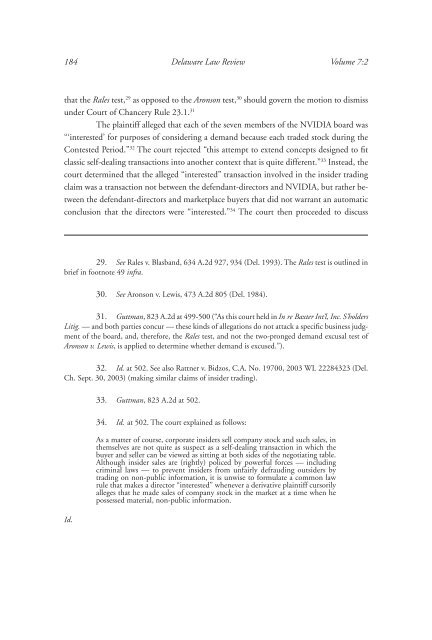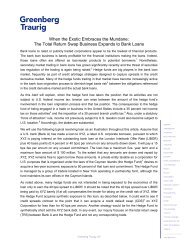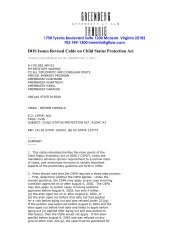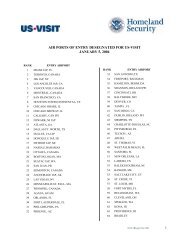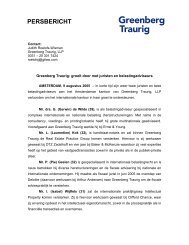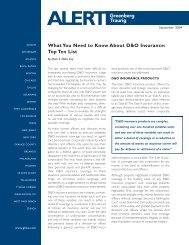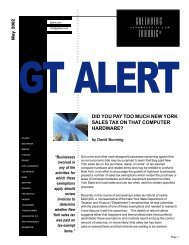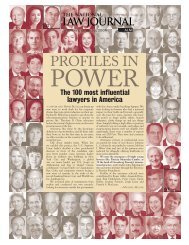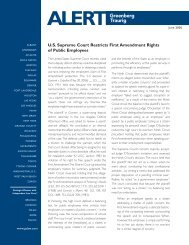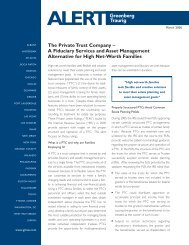recent developments in delaware corporate law - Greenberg Traurig ...
recent developments in delaware corporate law - Greenberg Traurig ...
recent developments in delaware corporate law - Greenberg Traurig ...
You also want an ePaper? Increase the reach of your titles
YUMPU automatically turns print PDFs into web optimized ePapers that Google loves.
184 De<strong>law</strong>are Law Review Volume 7:2<br />
that the Rales test, 29 as opposed to the Aronson test, 30 should govern the motion to dismiss<br />
under Court of Chancery Rule 23.1. 31<br />
The pla<strong>in</strong>tiff alleged that each of the seven members of the NVIDIA board was<br />
“‘<strong>in</strong>terested’ for purposes of consider<strong>in</strong>g a demand because each traded stock dur<strong>in</strong>g the<br />
Contested Period.” 32 The court rejected “this attempt to extend concepts designed to fit<br />
classic self-deal<strong>in</strong>g transactions <strong>in</strong>to another context that is quite different.” 33 Instead, the<br />
court determ<strong>in</strong>ed that the alleged “<strong>in</strong>terested” transaction <strong>in</strong>volved <strong>in</strong> the <strong>in</strong>sider trad<strong>in</strong>g<br />
claim was a transaction not between the defendant-directors and NVIDIA, but rather between<br />
the defendant-directors and marketplace buyers that did not warrant an automatic<br />
conclusion that the directors were “<strong>in</strong>terested.” 34 The court then proceeded to discuss<br />
29. See Rales v. Blasband, 634 A.2d 927, 934 (Del. 1993). The Rales test is outl<strong>in</strong>ed <strong>in</strong><br />
brief <strong>in</strong> footnote 49 <strong>in</strong>fra.<br />
30. See Aronson v. Lewis, 473 A.2d 805 (Del. 1984).<br />
31. Guttman, 823 A.2d at 499-500 (“As this court held <strong>in</strong> In re Baxter Int’l, Inc. S’holders<br />
Litig. — and both parties concur — these k<strong>in</strong>ds of allegations do not attack a specific bus<strong>in</strong>ess judgment<br />
of the board, and, therefore, the Rales test, and not the two-pronged demand excusal test of<br />
Aronson v. Lewis, is applied to determ<strong>in</strong>e whether demand is excused.”).<br />
32. Id. at 502. See also Rattner v. Bidzos, C.A. No. 19700, 2003 WL 22284323 (Del.<br />
Ch. Sept. 30, 2003) (mak<strong>in</strong>g similar claims of <strong>in</strong>sider trad<strong>in</strong>g).<br />
33. Guttman, 823 A.2d at 502.<br />
Id.<br />
34. Id. at 502. The court expla<strong>in</strong>ed as follows:<br />
As a matter of course, <strong>corporate</strong> <strong>in</strong>siders sell company stock and such sales, <strong>in</strong><br />
themselves are not quite as suspect as a self-deal<strong>in</strong>g transaction <strong>in</strong> which the<br />
buyer and seller can be viewed as sitt<strong>in</strong>g at both sides of the negotiat<strong>in</strong>g table.<br />
Although <strong>in</strong>sider sales are (rightly) policed by powerful forces — <strong>in</strong>clud<strong>in</strong>g<br />
crim<strong>in</strong>al <strong>law</strong>s — to prevent <strong>in</strong>siders from unfairly defraud<strong>in</strong>g outsiders by<br />
trad<strong>in</strong>g on non-public <strong>in</strong>formation, it is unwise to formulate a common <strong>law</strong><br />
rule that makes a director “<strong>in</strong>terested” whenever a derivative pla<strong>in</strong>tiff cursorily<br />
alleges that he made sales of company stock <strong>in</strong> the market at a time when he<br />
possessed material, non-public <strong>in</strong>formation.


